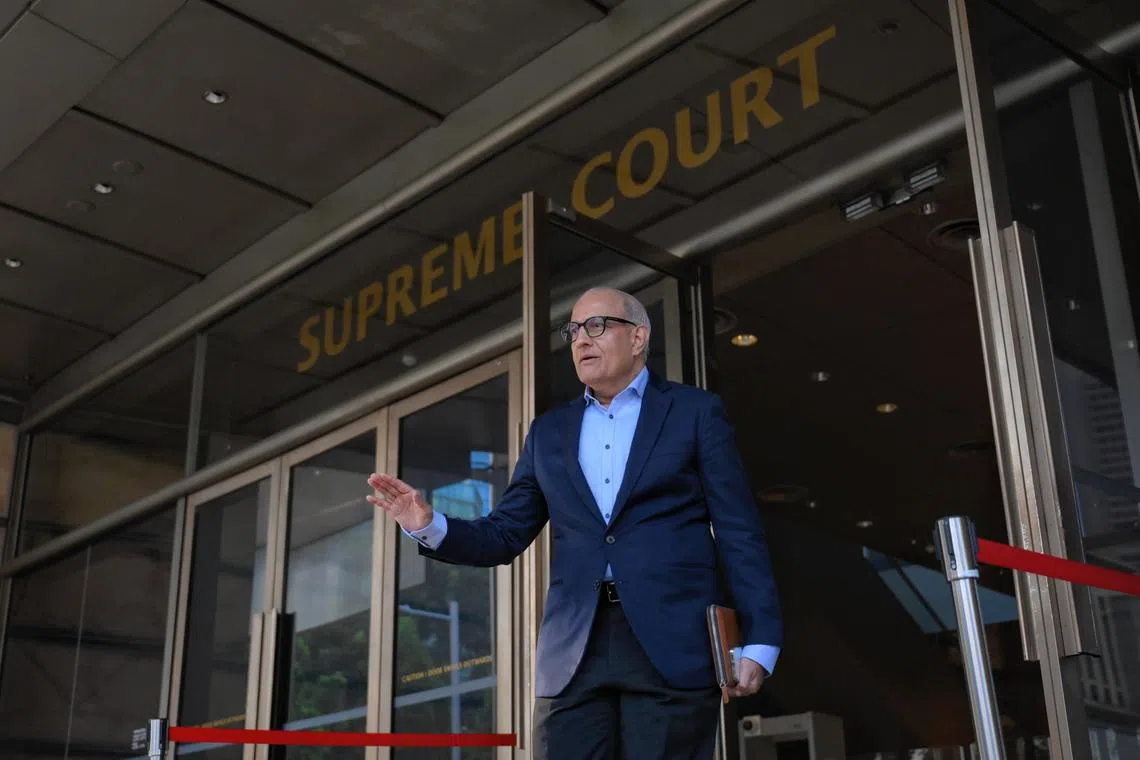askST: What is a criminal revision, the application Iswaran filed in the High Court?
Sign up now: Get ST's newsletters delivered to your inbox

Former transport minister S. Iswaran leaving the Supreme Court on July 5.
ST PHOTO: MARK CHEONG
Follow topic:
SINGAPORE - Former transport minister S. Iswaran returned to the High Court on July 5 for a criminal revision application, following a successful bid for a joint trial
Iswaran currently faces 27 charges relating to hotel and property tycoon Ong Beng Seng, and eight charges relating to Mr David Lum Kok Seng,
Iswaran appeared in the High Court with members of his legal team from Davinder Singh Chambers in a bid to compel the prosecution to hand over conditioned statements
A conditioned statement is a written statement that can be used as evidence in court in certain scenarios.
Lawyers and legal experts break down the process of a criminal revision application for The Straits Times.
1. What is a criminal revision application?
A criminal revision is not an appeal – it is a hearing by the High Court to review the decision or proceedings in a lower court, said Mr Alexander Woon, provost’s chair at the Singapore University of Social Sciences School of Law.
Mr Woon, who is also a lawyer with RHTLaw Asia, said: “A criminal revision usually looks mainly at the procedure, not substance.
“In a revision, the High Court is looking at the ‘correctness, legality, propriety and regularity’ of the State Courts proceedings.”
The revision can be made on any judgment, sentence or order, he added.
In Iswaran’s case, which has not commenced in the High Court, senior criminal defence lawyer Rajan Supramaniam from Regent Law said this could be a review of prior processes.
The former minister faces 35 charges, of which 24 fall under Section 165 of the Penal Code – making him the first in 153 years to face those charges.
Section 165 makes it an offence for a public servant to accept gifts from someone involved with him or her in an official capacity.
“The High Court will review the application and look at the merits of the claim. For example, this can happen for bail applications when they are sometimes denied by the lower courts,” said Mr Rajan.
2. When are criminal revisions typically filed?
Criminal revisions are often used when there is a serious injustice that has occurred, said Associate Professor Mervyn Cheong from the National University of Singapore’s law faculty.
Some examples include cases where “the lower court imposes a sentence that exceeds what it can impose by law, or when the lower court should have rejected a plea of guilt but did not and went ahead to sentence the accused”, he said.
Criminal revisions can also be filed if proceedings in the State Courts do not properly follow the rules of the Criminal Procedure Code, according to Mr Woon.
“Criminal revisions should not be used as ‘backdoor’ appeals. If the substance of the case needs to be considered, the proper route would be an appeal,” he said.
Criminal revision applications are also more commonly seen in cases where there is a need to review a plea of guilt, change of convictions, nature of sentences, or if new material facts have surfaced after a sentence has been meted out, according to Mr Rajan.
3. Are applications for criminal revisions generally successful?
Mr Rajan said that while the application process for a criminal revision is open to everyone, it has been only sparingly successful in Singapore.
“It is rarely successful unless there is grave injustice or it is an exceptional case, and parties will have to prove that there was an injustice or mistake in the process,” said Mr Rajan.
He pointed to the recent case of Vang Shuiming, one of the 10 foreigners convicted
In October 2023, Vang had submitted a criminal revision application
The High Court’s Justice Vincent Hoong concluded that he had not found anything “palpably wrong” in the district judge’s bail decision such that a serious injustice had been committed against Vang.
Mr Rajan, who had served as an officer in the Singapore Prison Service before becoming a lawyer, told ST that he had also heard of many cases where those who filed for criminal revisions and failed in their applications had their sentences enhanced.

